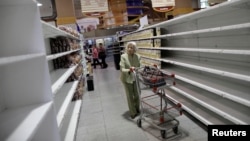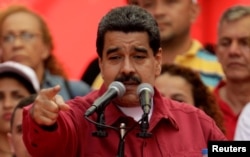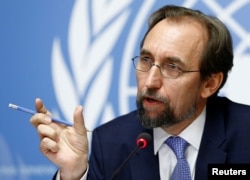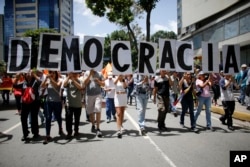On the eve of his first address to the United Nations General Assembly, U.S. President Donald Trump is scheduled to host a working dinner with several Latin American leaders. On the table: Venezuela's political and economic crisis, along with the region's security and economy.
"The focus is indeed Venezuela — restoring the democracy and supporting the people," a senior White House official, who did not wish to be identified, said of the Monday dinner at Lotte New York Palace.
Trump is expected to be joined by his counterparts from Brazil (Michel Temer), Colombia (Juan Manuel Santos), Panama (Juan Carlos Varela) and Peru (Pedro Kuczynski).
The U.S. president is "looking forward to discussing the crisis in Venezuela, as well as our increasingly strong economic ties, shared goals for elevating the prosperity of our peoples, and the extraordinary success of like-minded Latin American nations in recent decades," his national security adviser, H.R. McMaster, said at a White House press briefing Friday.
Conspicuously absent this week will be Venezuelan President Nicolas Maduro, whose foreign minister, Jorge Arreaza, previously said the leader was "very busy with regional elections, working on economic matters" and on the controversial national constituent assembly he assigned to rewrite the country's constitution. That powerful new assembly has tried to wrest power from the internationally recognized legislative branch, the National Assembly.
Arreaza, instead, will represent Venezuela at the U.N. gathering. He's scheduled to address the international body on Thursday afternoon.
The Trump administration has labeled Maduro "a dictator" and its constituent assembly "illegitimate"; its 545 pro-government members include the leader's wife and son. The U.S. Treasury Department also personally sanctioned Maduro, freezing his assets under U.S. jurisdiction – though it's unclear just what, if any, those might be — and forbidding any U.S. citizen from doing business with him.
Years of deepening political and economic turmoil in the South American reached desperate levels in early April. Venezuelans began staging massive street protests to demand regional and presidential elections, the release of political prisoners and access to humanitarian aid. More than 120 people died in protest-related clashes. But suffering is widespread in the oil-rich country of 32 million, with triple-digit inflation, rampant hunger and soaring crime rates.
Criminal probe requested
Last week, U.N. High Commissioner for Human Rights Zeid Ra'ad Al Hussein called for a criminal investigation into allegations that Maduro's government has used excessive force against protesters and otherwise tried to suppress political opposition.
"There is a very real danger that tensions will further escalate, with the government crushing democratic institutions and critical voices," Hussein told the UN Human Rights Council.
Last Thursday, the Organization of American States began public hearings on whether the Maduro government should be referred to the International Criminal Court (ICC).
Arreaza, the Venezuelan foreign minister, refutes allegations of rights abuses, saying they've been concocted as excuses to meddle in the country's internal affairs.
"Recent reports against Venezuela lack methodological rigor, are unfounded, induced and directed to disrupt the sovereignty, peace and stability of our people," he said.
Peace talks?
Meanwhile, talks between Venezuela's government and its political opposition stalled after two days of meetings last week in the Dominican Republic. The two delegations were "close to an agreement, of political co-existence, of peace and sovereignty," Maduro said in a speech Friday, according to Reuters.
But opposition leaders later characterized the talks as "exploratory" and said they would not advance unless the government proved it was serious about democratic reforms, Reuters said. Measures would include setting a 2018 date for presidential elections and respecting the National Assembly.
"We are supporting those [peace] efforts, hoping that there will be some result," White House spokeswoman Lydia Barraza told VOA on Monday. She added that the UN and its Human Rights Council must look critically at the "violation of human rights" and Venezuela's constitution.
On Wednesday, U.S. Secretary of State Rex Tillerson plans to meet with at least some of the 12 signatories of the OAS Lima Declaration, which pledges to "explore ways to contribute to the restoration of democracy" in Venezuela "through peaceful and negotiated means."
Brazil, Colombia, Panama and Peru are among the signatories — along with Argentina, Canada, Chile, Costa Rica, Guatemala, Honduras, Mexico and Paraguay.
VOA White House correspondent Pete Heinlein contributed to this report from New York and Spanish Service correspondent Alvaro Algarra assisted from Caracas, Venezuela.







